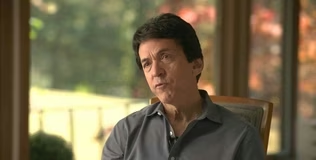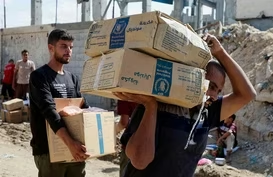
The latest advances in breast cancer prevention, treatment
Clip: 10/11/2025 | 6m 27sVideo has Closed Captions
A look at the latest advances in breast cancer prevention and treatment
For the past 40 years, pink ribbons have sprouted every October as the symbol of Breast Cancer Awareness Month. To take stock of the latest in breast cancer research and the experience of patients, Ali Rogin speaks with Dr. Arif Kamal, the American Cancer Society’s chief patient officer, and Kristen Dahlgren, founder of the Cancer Vaccine Coalition.
Problems playing video? | Closed Captioning Feedback
Problems playing video? | Closed Captioning Feedback
Major corporate funding for the PBS News Hour is provided by BDO, BNSF, Consumer Cellular, American Cruise Lines, and Raymond James. Funding for the PBS NewsHour Weekend is provided by...

The latest advances in breast cancer prevention, treatment
Clip: 10/11/2025 | 6m 27sVideo has Closed Captions
For the past 40 years, pink ribbons have sprouted every October as the symbol of Breast Cancer Awareness Month. To take stock of the latest in breast cancer research and the experience of patients, Ali Rogin speaks with Dr. Arif Kamal, the American Cancer Society’s chief patient officer, and Kristen Dahlgren, founder of the Cancer Vaccine Coalition.
Problems playing video? | Closed Captioning Feedback
How to Watch PBS News Hour
PBS News Hour is available to stream on pbs.org and the free PBS App, available on iPhone, Apple TV, Android TV, Android smartphones, Amazon Fire TV, Amazon Fire Tablet, Roku, Samsung Smart TV, and Vizio.
Providing Support for PBS.org
Learn Moreabout PBS online sponsorshipJOHN YANG: Every October for the past# 40 years, pink ribbons have sprouted as## the symbol of Breast Cancer Awareness Month.# It's a good time to take stock of the latest## in breast cancer research and the experience of# patients.
Ali Rogin spoke with Dr.
Arif Kamal,## the American Cancer Society's chief patient# officer and a Duke University Medical School## professor and Kristen Dahlgren,# a former NBC News correspondent## who's a breast cancer survivor and the# founder of the Cancer Vaccine Coalition.
ALI ROGIN: Thank you both so much for joining# me.
Arif, I'd like to start with you.
We have,## as a country been commemorating Breast# Cancer awareness month for 40 years now.## What are some of the major milestones you# see that we've achieved over that time?
ARIF KAMAL, Chief Patient Officer,# American Cancer Society: Yeah,## 40 years is pretty r.. really center around the number 40, actually,# for a lot of the great accomplishments.
Breast## cancer mortality has reduced by over# 40 percent over that period of time.
In addition, we've now reduced the age of which# we recommend starting mammograms now down to the## age of 40.
In addition, we're starting to see# other areas of disparities and gaps closing## as well.
Mammogram rates, for example, are at# all-time highs across multiple communities.
Now,## we still got some room to grow, but a lot has# happened over, you know, a couple decades of time.
ALI ROGIN: And to that point,# Arif, sticking with you,## where do some of the main challenges still remain?
ARIF KAMAL: You know, again, I'll stick to the# number 40 here for a minute.
So black women,## for example, are 40 percent more likely# to die of breast cancer when matched## stage for stage with white women.# In addition, we're starting to see,## you know, some areas and pockets of# mammogram low rates across the country.
In addition, we're starting to# see some of the experience be## varying across different populations.
For example,## some data from the American Cancer Society# looked at loneliness and social isolation,## and we found that breast cancer survivors# only reported about 40 percent of them having## adequate social support during the course of their# cancer treatment.
So we've got some work to go.
ALI ROGIN: Kristen, you come at this from# so many interesting places yourself.
You## were diagnosed with stage two breast# cancer in 2019, and following that,## you've committed your work to pursuing a# vaccine for breast cancer.
What inspired## you to make this more than just your# own personal breast cancer journey?
KRISTEN DAHLGREN, Founder, Cancer Vaccine# Coalition: I was a network correspondent## and I was 47 when I was diagnosed.# You know, I went through my treatment,## but it wasn't easy.
And as soon as I learned as# part of my reporting that there were breast and## other cancer vaccines in development, I was# blown away.
And I didn't believe it at first.
Once I learned that these are not just# pie in the sky down the road treatments,## they actually are included clinical trials# and seeing incredible results, I had to do## something about it.
So I decided to put together a# coalition of top doctors from around the country.
We're bringing them together for some# collaborations.
These research trials## take a lot of funding, so we're raising# money to help accelerate the process and## then we're out there talking about it# so that people know what's available.
We don't have to do these treatments, you# know, that are were developed in the 1800s## and in the mid-century.
And, you know, there# really is this future down the road and it## could be closer if we get behind this idea that# our immune systems really can fight off cancer.
ALI ROGIN: And speaking of that# research, Kristen, sticking with you,## how has that research, if at all been affected# by some of the cuts we're seeing from HHS,## particularly when it comes to things# like MRNA platforms for vaccines?
KRISTEN DAHLGREN: Right.
So, you know,# the head of NIH went on TV and said,## our concerns and what we're doing in the# MRNA space, cutting research does not## apply to cancer vaccines.
Those are really# promising.
We need to pursue that research.
Cancer is nonpartisan.
It doesn't care which# way you vote.
It impacts all of us.
And so## while there have been funding cuts, I think if# the government gets better behind this type of## forward thinking in modern medicine,# we really could change things.
And## so it's something that I'm really passionate# about, encouraging our government to do more## and more research in this space because it# could be world changing for so many of us.
ALI ROGIN: And you both are thinking a lot and# doing a lot to address the patient experience.## So what would your message be to somebody who# has breast cancer on the mind right now?
Either## because they're going through a diagnosis or they# are facing screening.
Arif, let's start with you.
ARIF KAMAL: The reality is today, many# people, even with advanced disease,## don't require or need chemotherapy that# makes them lose their hair or stay in bed## for long periods of time.
Oftentimes# now, the average person with cancer## is someone who may be next to you on# a train or maybe with you at work.
As cancer becomes an experience for# many people that lasts now, you know,## over months and potentially even years, means we# have to continue to reform the oncology delivery## community to think about these journeys now# being measured over marathons instead of sprints.
ALI ROGIN: Kristen?
KRISTEN DAHLGREN: Yeah, I like that because# this i.. these long lives ahead after a cancer# diagnosis.
I know for me, I'm aware of## cancer every day and I think we need to look at# it year round as something that we're aware of.
For me as a patient, I worry about recurrence and# it's why you know, getting additional treatments,## more interventions that could prevent# recurrence is so important.
I also found## my own breast cancer.
I had a mammogram in# May of 2019 and just four months later I## saw a dent in my breast and I insisted on more# screening.
It turned out I had dense breasts.
I didn't understand what that meant and that# I could have gotten more screening after that## initial mammogram because that if we can do# earlier detection and better screening and## then we can have more interventions and things# that make a better outcome as far as treatments,## we really could get this disease even more under# control than we have over the past 40 years.
ALI ROGIN: Such important messages.# Dr.
Arif Kamal and Kristin Dahlgren,## thank you so much.
KRISTEN DAHLGREN: You bet.
ARIF KAMAL: Thank you.
Humanitarian author Mitch Albom on love and second chances
Video has Closed Captions
Clip: 10/11/2025 | 9m 14s | Author and humanitarian Mitch Albom on love, hope and second chances (9m 14s)
News Wrap: Trump orders Pentagon to pay troops amid shutdown
Video has Closed Captions
Clip: 10/11/2025 | 1m 24s | News Wrap: Trump orders Pentagon to use ‘all available funds’ to pay troops amid shutdown (1m 24s)
Relief groups ready to surge aid to Gaza as ceasefire holds
Video has Closed Captions
Clip: 10/11/2025 | 6m 35s | Relief organizations ready to surge aid to Gaza as ceasefire takes hold (6m 35s)
Providing Support for PBS.org
Learn Moreabout PBS online sponsorship
- News and Public Affairs

FRONTLINE is investigative journalism that questions, explains and changes our world.

- News and Public Affairs

Amanpour and Company features conversations with leaders and decision makers.












Support for PBS provided by:
Major corporate funding for the PBS News Hour is provided by BDO, BNSF, Consumer Cellular, American Cruise Lines, and Raymond James. Funding for the PBS NewsHour Weekend is provided by...


